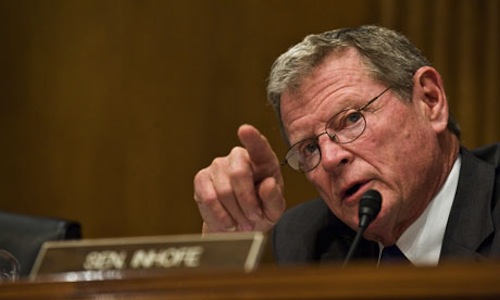I tried to link to a news article about this week’s Congressional hearings regarding the attack on the US consulate in Benghazi, but I had a hard time finding an unbiased source. Benghazi appears to be the most important story in the world for the Daily Caller, Fox News and the Washington Times (official motto: Not the Good Washington Paper) and invisible to everyone else. My theory is supported by this poll in which a mere 44% of Americans say they are following the hearings and, in a more complicated way, by this one, in which 41% of Republicans say they consider Benghazi “the biggest scandal in American history.” So suck it, Peggy Eaton Affair.
Also, it’s kind of weird that half of one party regards Benghazi as worse than the Teapot Dome Scandal, while half of America cannot be bothered to follow it in the news. To hear James Inhofe (R-OK) tell it, President Obama might resign over the cover-up, so you’d think they’d pay attention. From the same interview:
Of all the great cover-ups in history—the Pentagon papers, Iran-Contra, Watergate, all the rest of them—this…is going to go down as most egregious cover-up in American history.
In case you haven’t noticed, Senator Inhofe will kind of say whatever. His argument that greenhouse gas regulation hurts the poor is worth Googling, if you don’t mind a rage laser shooting out of your face, but I digress. The point is that half the country does not care about a story that half the Republican Party thinks is the biggest scandal in the history of the United States. That is weird.
Maybe it is weird because of the aforementioned difficulty in finding an unbiased news source. The internet era of political discourse has produced plenty of partisan reporting, but I believe Benghazi may be our first partisan story. Whether it is worth of attention—much less Congressional hearings and, even less, presidential resignation—seems to shake out entirely along party lines. Benghazi is either a nonstarter or the central event in American politics this week, depending on where you get your news.
The dissonance gets louder when you consider the central question in the quote-unquote scandal: whether the Obama administration was quick enough to call the attack on the US consulate an act of terrorism, or if it deliberately presented it as a spontaneous protest when it knew better. Yesterday, the Washington Post devoted 1000 words to whether the President’s saying “act of terror” was the same as saying “act of terrorism.” Such semantic questions point to a larger division in American politics over whether we should be calling everything terrorism or what.
I have little evidence to back this claim, but I suspect that the question of whether the United States has been engaged in a global war against a faceless enemy for the last 12 years similarly shakes out along party lines. The War on Terror is not a war. Terror is not a person or country. The idea that America is at war with a tactic that is also a mysterious network of freedom-hating zealots is a creation of the Bush administration, and it has been more rhetorically useful to Republicans than to Democrats.
The President’s failure to call Benghazi “terrorism” quickly enough—or, if you prefer, his reprehensible attempt to present an act of terror as simple mob violence in the months before an election—is therefore the perfect partisan scandal. For Democrats and, according to UPI, most independents, it’s a pointless quibble over words. For Republicans, it’s a pointed quibble over words that keep America safe and strong.
I think those words keep America dumb. I don’t think the war on terror is a real thing, and even if it is, it is hardly the most pressing problem facing the United States. Besides this made-up war with no objectives against an unknown enemy, we also have a jobless recovery, massive student debt and an existential environmental crisis to worry about. Each of those problems is much more more important than Al-Qaeda, but it’s a lot harder to talk about them than it is to make patriotic declarations about how America’s enemies will be punished.
I’m not sure that the President’s failure to appropriately grandstand in the first 72 hours after Benghazi is a scandal on the same order as Watergate. I am pretty sure that the question of who is tougher on terrorism has become the most tired issue in American politics. Right now, Congress is hotly debating whether the executive branch spoke correctly about an event that happened nine months ago. I’m glad they have found the most important controversy in American history, since so little else seems to capture their interest.





Well bespoke, as usual, Dan. I think some commedian or other made this point early in the W on T, but I never tire of reiterating it: terror is not a tactic. It’s an emotion. And the move from the “ism” to the psychological category is not a lazy erosion of the term; it’s a strategic circumlocution that Obama has struggled to reverse. We went from “nothing to fear but fear itself” to “here’s how much you should fear in a color-coded daily index” to … whatever Obama’s doing now.
Glen Kessler can’t throw down 4 Pinnochios to enforce the difference now because we all abandoned the ism for the emotion some time ago. You couldn’t invade Iraq in 2003 to fight terror-ism; but you could to fight terror. Congressional Republicans are hoping for a scandal beneath Obama’s vague parsings of terror but the only consequence of it all that they can point to is … “You should have told us to be more afraid at the time instead of letting us cool off for a couple weeks first. How dare you deprive us of our terror.”
Meh, that’s a clumsy way of putting it. Which is why I must thank you, again, for tackling the subject with such grace and precision. End of blather. Carry on.